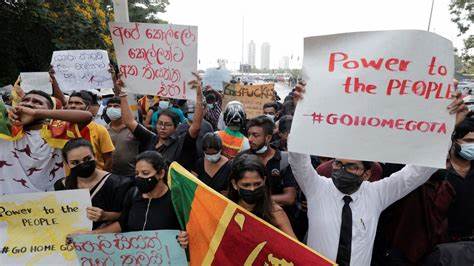COLOMBO: Following days of mass protests over the island nation’s chronic economic situation, Sri Lanka’s president lost his parliamentary majority on Tuesday as erstwhile friends sought his resignation.
This is the worst economic crisis for the country since it gained independence from Britain in 1948, because of unprecedented scarcities of food and fuel and high prices and rolling blackouts.

One day after assuming office, the new finance minister resigned, bringing the once-dominant ruling coalition of President Gotabhaya Rajapaksa to its knees.
A fifth straight day of anti-Rajapaksa protests has prompted a warning from the administration that it will respond with force should the protests turn violent.
According to defence ministry secretary Kamal Gunaratne, “security forces would not hesitate to implement the law against anyone engaging in violence.”.
Since Friday, over 60 individuals have been detained in connection with the unrest, and many of those detained claim they were tortured by police.
The UN Human Rights Council said it was keeping a careful eye on the deteriorating situation in Sri Lanka, which is already under fire for its human rights record. it.
Because of Sri Lanka’s “trend towards militarisation and weakening of institutional checks and balances,” the UNHRC observed, the state’s capacity to effectively confront the economic crisis has been hindered.
Sri Lankan rage has reached boiling point, with mobs attempting to break into the houses of many top government leaders since the weekend.
Wijeyadasa Rajapakshe, a newly independent legislator who broke ranks with the president’s party and backed demands for the leader to stand down, stated, “If we don’t act now, there would be a river of blood in the nation.”
“We must set aside partisanship and establish an interim administration.”
Parliament convened for the first time on Tuesday, after several MPs, including 16 members of Rajapaksa’s party, withdrew their support for the administration (SLPP).
The 225-member house is currently at least five members short of a majority for the administration, but no indication has been given that lawmakers would seek to overthrow it through a motion of no confidence.
Mahinda Rajapaksa and his brother, former President Mahinda, have previously rejected Rajapaksa’s demand to form a unity government.
The state of emergency proclaimed by their administration last week is slated to expire next week unless parliament ratifies the decree.
The administration cut short Tuesday’s sessions by two hours, but promised a discussion on Wednesday, rejecting requests for a vote on the emergency declaration.
An ex-minister who has also renounced Rajapaksa’s administration, Nimal Lanza acknowledged that his party no longer had an electoral mandate.
During his speech, he addressed the PM, who was there but did not speak. “I beg and implore you to take the side of the demonstrators.”
It was late Sunday night, and everyone except the president and prime minister of Sri Lanka had resigned from their posts.
Just one day into his new role, Finance Minister Ali Sabry resigned from the Cabinet, replacing the president’s eldest brother Basil Rajapaksa.


